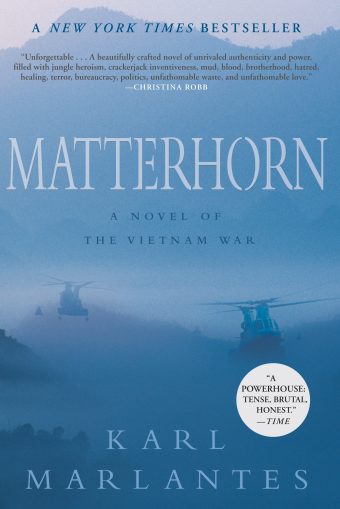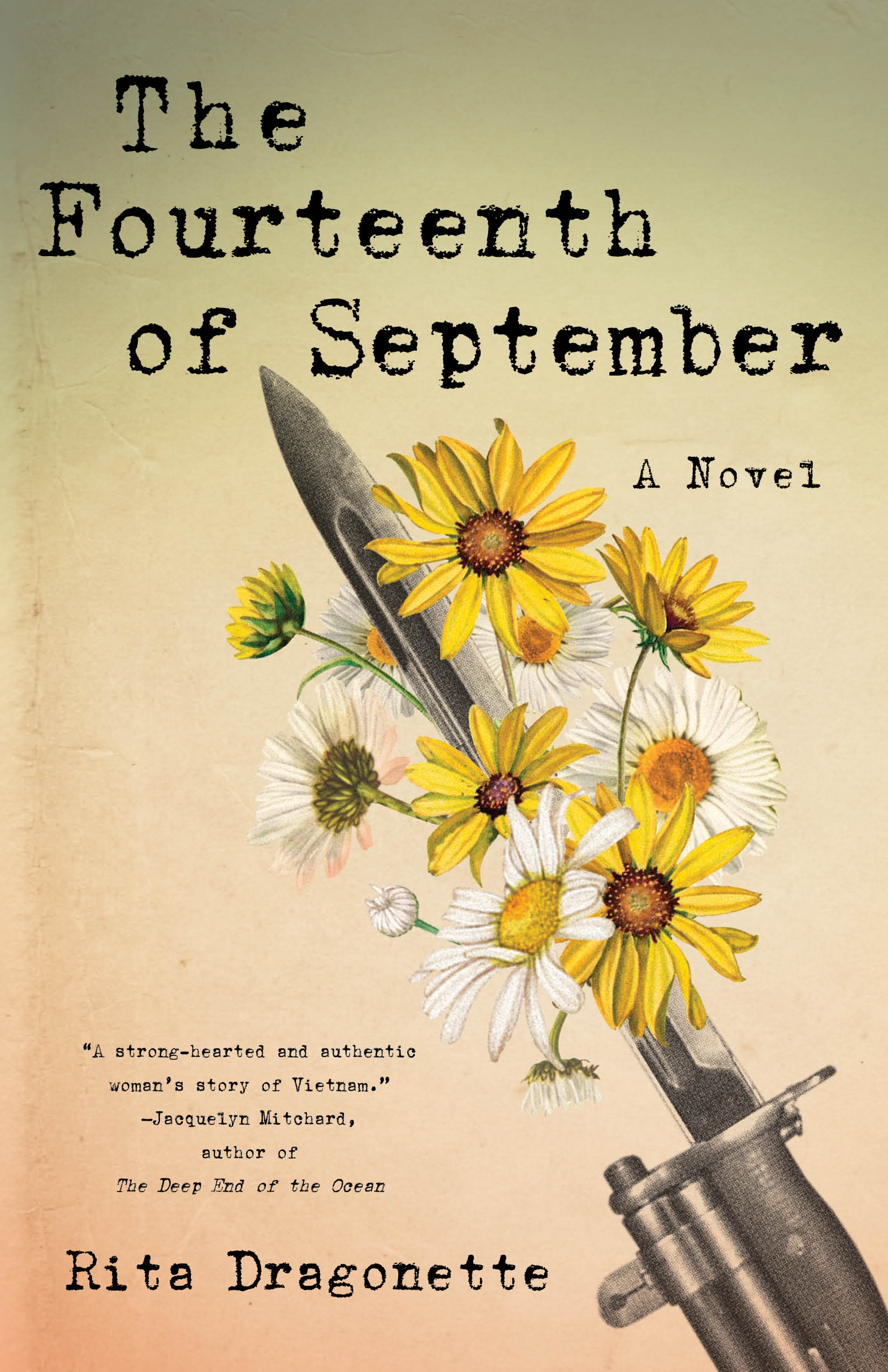Readers Weighed in on the Best Books About the Vietnam War
The New York Times ran a list of the top ten books to read about the Vietnam War in September 2017, prior to the broadcast of the Ken Burns documentary. Many readers wrote in with their own favorites, which prompted a follow-up article.See the article HERE.
Heading up the readers' suggestions of fiction novels is Matterhorn: A Nevel of the Vietnam War, by Karl Marlantes, which won an IPPY Award medal for literary fiction in 2010. It was also reviewed by Sebastian Junger in the Sunday Book Review. See the review HERE.

Feature
Five Reasons Why the Vietnam War as a Subject for Fiction Is Viable Again
Debut Novelist Makes Her Case

Once overdone with powerful but similar points of view and story situations, and colored by the shame of defeat, the subject of the Vietnam War has now resurfaced as fresh and vital—with new narrative potential, reader appeal, and amazing parallels for today.
1. We’re No Longer Sick of It.
In 2007, a New York Times review of the Vietnam novel Tree of Smoke by Denis Johnson asked, “Who would have thought we needed another book about that fiasco?” Though that statement was revised into a rave review by the end of the article, it reflected a common attitude. After a rash of thrilling but brutal, in-your-face novels, often by vets, beginning in the late ’70s (Going After Ciacciato, Fields of Fire), and even more memoirs (Born on the Fourth of July),it was time for a break. Compounding the issue was the equal number of nonfiction books (The Best and the Brightest, Fog of War) and the long series of widely seen films (Platoon, Apocalypse Now) that made the public feel not only overfamiliarity, but fatigue.
Back in 2003, when I submitted a workshop piece set in 1969, the first comment was “I’m so sick of Vietnam”; the second, from the instructor, was “I agree.” I was dumbfounded, particularly since I was pretty sure both of these people had lined up for the latest World War II movie. But for a long time, there just wasn’t a lot of enthusiasm if you told someone you were working on a story about Vietnam. Yeah, they’d say, helicopters, jungle patrols, painful but pointless, brutal but bad—got it. Even the magnificent Tim O’Brien had taken down his shingle on the subject.
Bottom line, everyone thought they knew the story and just couldn’t listen and feel bad any more.
But lately we’ve found that we didn’t know the story—certainly we didn’t know the whole, rich, multifaceted story—and new revelations and necessary distance have placed Vietnam up with the Holocaust and Watergate as eternally fascinating, offering ever new angles, new heroes and demons, a Pandora’s Box of story potential for a newly curious reading public.
2. The Ken Burns Factor
This past fall, a literature teacher posted on Facebook that although she and her family rarely watched television—not when there were books to read—they were glued to the set for the ten nights Ken Burns’ documentary The Vietnam War unfolded. Burns spent a decade on research and had access to newly unclassified files and, above all, to the point of view of the other side—with compelling interviews and insights from the North Vietnamese “enemy.” His tag line, “There Is No One Truth in War,” invites us to take that new information and creatively run with it. If after seventy years we still come up with fresh World War II subjects to fuel books like The Lilac Girls and The Zookeeper’s Wife, imagine what story potential we can mine below the surface waiting to be scratched about Vietnam? Stephen Spielberg’s Academy Award-nominated retelling of the Pentagon Papers situation in The Post is further evidence that there’s new interest in mining even stories we thought we knew about Vietnam. The well is full again, and that literature teacher can turn off her TV set and confidently pen a Vietnam story of her own.
3. The 50th Anniversary Celebrations Are Doing the Marketing Heavy Lifting.
Every day we are marking significant anniversaries of the time—so far this year already we’re reminded of the Tet Offensive, the March 31 date that Lyndon Johnson announced he wouldn’t run again for president, the assassinations of Martin Luther King Jr and Bobby Kennedy, and the Broadway debut of Hair. And it will continue; to name some of the big ones: the Democratic Convention (where we first heard the phrase “The Whole World Is Watching”) yet this year, the Chicago Conspiracy Trial in 2019, and Kent State in 2020. The news coverage is now—and will continually be—reminding the public of and conditioning the environment for new examinations of these milestones, and creating an ongoing marketing campaign for new narratives set in those times.
4. Diversity Is the New Zeitgeist
The current focus on diversity in virtually every aspect of American life and proliferation of fiction about the immigrant experience illustrates more interest than ever before in new perspectives on subjects we thought we knew. Viet Thanh Nguyen’s Pulitzer Prize-winning The Sympathizer combines both war and refugee experience from the Vietnamese point of view into a revelation of a novel whose success virtually guarantees readership for even more variations of the war and its aftermath. There’s huge opportunity, for example, for stories that revisit the experiences of alternative characters—from non-white soldiers to the neglected topic of women impacted by the war both directly and indirectly. These new angles need not be confined to traditional “war stories,” but instead ripple through young adult and women’s fiction, thrillers and crime genres, and more.
5. Nixon and Trump—The Hamster Wheel of History.
When Ken Burns introduced his documentary series to a live audience in Chicago in September, he asked them to imagine a country headed by an administration no one trusted; a leader no one respected, potentially to be under indictment; a government and society polarized and paralyzed; a swirl of conspiracy theories. The audience laughed on cue when he said he was talking about the late ’60s and not today. But it was an uncomfortable moment of mirth.
The parallels to the current world situation make the painful lessons of Vietnam more than cautionary, including, as we face a situation where brash words can escalate hot spots around the world to war in a flash. If that happens, it’s important to consider that the current volunteer army won’t be sufficient. In that case, a new draft is inevitable, and the history of what happened in Vietnam and its ramifications through every aspect of society over the past fifty years, however we’ve chosen to ignore it, will be ripe and relevant for a new generation of readers interested in learning more about what we’ve swept under the rug. So many parallel scenarios could play out with similarly frightening consequences, all of which offer narrative potential for audiences with heightened interest in the subject.
I felt it was particularly telling that a high school teacher I know has recently taken to teaching Shirley Jackson’s “The Lottery,” alongside The Things They Carried and The Hunger Games. Her students get the connections and want to know more about this mysterious Vietnam War and what it means for today.
Much more. They’re waiting for new stories. It’s time.
* * * * * *

Rita Dragonette is a former award-winning public relations executive turned author. Her debut novel, The Fourteenth of September, is a woman’s story of Vietnam whichwill be published this fall by She Writes Press. She is currently working on three other books: an homage to The Sun Also Rises about expats chasing their last dream in San Miguel de Allende, a World War II novel based upon her interest in the impact of war on and through women, and a memoir in essays. She also regularly hosts literary salons to introduce new works to avid readers. www.ritadragonette.com

